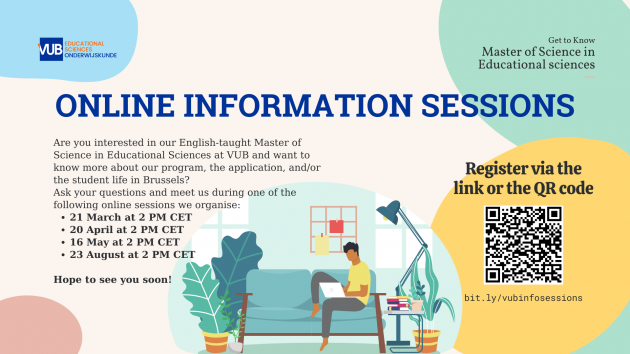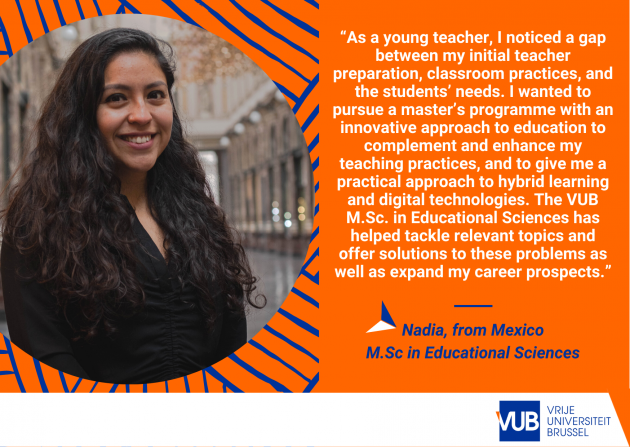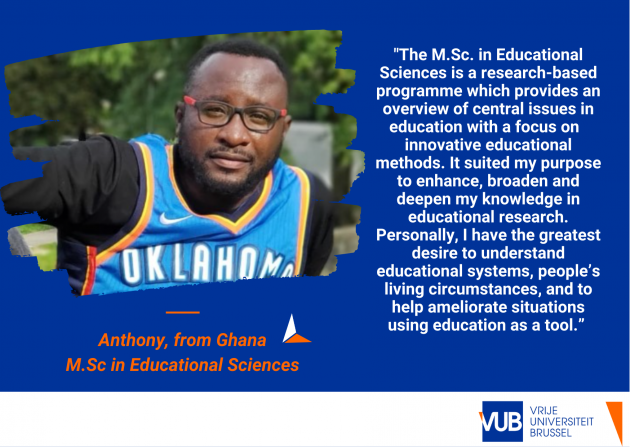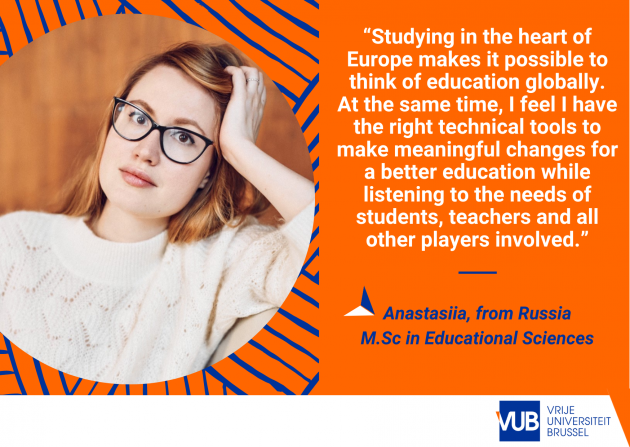Educational Sciences
- Do you have a professional or academic bachelor's degree and would you like to continue your studies in an international environment?
- Do you want to delve into educational innovation, e-learning and effective learning environments?
- Do you want to contribute to research and solutions of global educational questions?
If so, our Master of Science in Educational Sciences is the right choice.
GET TO KNOW OUR PROGRAMME IN A FEW MINUTES
“The main advantage of research-based education is the fact that you can immediately test the interaction between theory and practice. When students experiment with new methods in professional development and observe the results immediately, when they apply the newest counseling methods in the guidance of educational practitioners, when they are involved in the research of our scientists, … they feel directly involved and experience for themselves the benefits of a fascinating learning process.”
Professor Lombaerts
Innovation through research-based education
Applying scientific research methods
Innovative approaches to education are stressed through research-based education. Within the programme, students are encouraged and trained to apply scientific research methods to engage in educational innovations, including innovative teaching and assessment, blended learning, professional support and use of digital technologies to support education...
Innovative thinking is not only needed for educating the current and future generations, it’s crucial for the development of our society. In this programme we address critical issues and our students are prepared with both theoretical and professional knowledge, gaining the skills to contribute to society’s educational and social innovations. In this, the uniqueness of our international student population is an asset: we’re able to conduct research in an international perspective, thus enhancing our students competences in a multicultural environment.

Student voices



Want to know more about next academic year?
Check out the latest updatesAny questions?
Don’t hesitate to write us an email. We’d be happy to help you on your way!
Contact us
Educational Quality
Here at VUB we put great care and effort in the quality of our education. Transparency is key. Information on the educational quality of each programme is public, e.g. describing its strengths and actions.
Public info on the quality of the programme
The programme in detail
The two-year Master in Educational Sciences aims to prepare students for academic and professional interventions in the field of educational innovation. It prepares students for research into the nature, development and features of educational actors, institutions, related policies, and processes in educational development and educational practices.
Study credits
ECTS (European Credit Transfer System): 1 credit represents 25-30 hours of study activity.
| TYPE | MASTER 1 | ECTS | MASTER 2 | ECTS |
|---|---|---|---|---|
| Compulsory courses | Total: 36 | Total: 12 | ||
| Educational Change and Innovation | 6 | Case Studies Change and Innovation | 6 | |
| Educational Design | 6 | Global Education and Development | 6 | |
| Electronic Learning Environments | 6 | |||
| Educational Effectiveness | 6 | |||
| Curriculum Development | 6 | |||
| Professional Development and Leadership | 6 | |||
| Internship | Total: 24 | |||
| Internship Educational Sciences | 24 | |||
| Research | Total: 6 | Total: 24 | ||
| Research Seminar and Research Ethics | 6 | Master Thesis Educational Sciences | 18 | |
| Thesis Seminar Educational Sciences | 6 | |||
| Optional courses | Total: 18 | Total: 0 | ||
| Mandatory: condition admission procedure | Data Analysis in Educational Sciences | 6 | ||
| Total: 60 | Total: 60 |
Learning outcomes
Learning outcomes describe the intended knowledge and understanding, skills and attitudes that you must master after completing your studies.
Do you want to know more about the specific learning outcomes of this programme? Click here for more information.
Our alumni's best memories
Advice for future VUB students
The end? Or just the beginning?
There is no doubt that your Master of Science in Educational Sciences will stand out on the labour market. But which direction will you go?
Alumni Talk
Are you interested in where our alumni end up after graduating and how they look back on the master's programme?
More inspiration from our alumni
Below you will find tips & tricks from our VUB alumni. Use these as inspiration for your own career path!
Phd?
If you want to continue your academic career, you can apply for a PhD position at the Vrije Universiteit Brussel. All you need is a promoter, research subject and sufficient funding. Are you up for this challenge?
More info
Want to know more about our alumni
More infofollow the VUB
On LinkedInAdmissions
Find the information you need
Click on one of the topics to find more information.
Do you have a question that is not listed or that you would like to know more about? Do not hesitate to send an email to facpe@vub.be.
Direct admission is granted if you obtained a Belgian Bachelor of Science degree in Educational Sciences, Pedagogical Sciences, and Adult Education Sciences. Direct admission is also granted if you obtained a Belgian Bachelor of Science degree in Psychology or Social Sciences.
If you obtained a non-Belgian Bachelor’s degree in Educational Sciences, Pedagogical Sciences, Psychology, Social Sciences or Academic Teacher Education, your file will be evaluated by the Admission Board. The Board will take into account your educational expertise and academic proficiency. Depending on your background, the Board might impose you to register for the course “Data Analysis” as one of your optional courses. Therefore, the department advises you to demonstrate your academic writing competence (cf. formal writing, APA guidelines) in your motivation letter and to make your educational background knowledge (cf. obtained credits or work experience) explicit.
If you obtained any other degree, your file will be screened thoroughly by the Admission Board. Evidence of educational expertise, academic proficiency and background in social sciences will substantiate the decision of acceptance. Therefore, the department advises you to demonstrate your academic writing competence (cf. formal writing, APA guidelines) in your motivation letter and to make your educational background knowledge (cf. obtained credits or work experience) explicit. If accepted, you will be required to substitute your optional courses by the course “Data Analysis”.
All information can be found on this website: https://www.vub.be/en/studying-at-the-vub/how-to-apply#apply.
We ask you to prepare the following documents digitally, so you can upload them during the online application process:
- Passport copy
- Profile picture (ends up on your student card and profile)
- Official undergraduate/bachelor and graduate/master’s degree(s) (if applicable)
- Official transcript of records of all degrees
- Proof of English language proficiency
- Motivational letter (1 or 2 pages)
- 2 reference letters
- Evidence of educational background/expertise
Your file will be thoroughly screened by the Admission Board. We take all submitted documents into account to substantiate the decision of acceptance. Therefore, we need to have access to your entire application file to let you know whether you are eligible or not.
Prospective students are advised to apply as soon as possible, even if they have not yet obtained their degree. Applications can only be submitted through our website. Information about the application deadline can be found here.
Note: if the proof of English proficiency or APS certificate is not ready before the deadline, you can always submit it later instead of missing the deadline.
It is a requirement from the department to all applicants to provide two recommendation letters. This, alongside other required documents, is an element that is taken into account in the acceptance of candidates.
The recommendation letters can date as of very recently or for instance from two-three years ago (i.e., recent letters are preferable). The letters should be written by either a mentor that you have had recently, or in the past through work, an internship or thesis (i.e., someone who has worked with you in a professional capacity, which is naturally dependent on your past level of education/work etc.).
Regarding the content, there is no required length or required content per se, but the letter should be concise and touch upon (with respect to the person who is writing and their experience with you as a student and/or worker), as to why you would be a good and fitting candidate for the programme in question.
Prospective students can provide proof of sufficient knowledge of English as language of instruction by meeting one of the following criteria:
https://www.vub.be/en/studying-at-the-vub/language-requirements
We require master applicants to have a certain degree of demonstrable experience within the field of educational sciences or to have a sufficient methodological background. This is a qualifying expectation that is applied to all applicants to the incoming programme intake. Students with insufficient background in Statistics will be required to substitute one optional course by the course “Data Analysis" during the first year of the Master programme.
Applications are processed in the order they are submitted. After submitting an online application, the entire procedure can take up to 10 weeks. You will be notified of the final result of your application via email. If you have not received an answer after 10 weeks, please contact: studentadministration@vub.be.
It is not possible to fast track the application.
Due to COVID-19, the VUB organises only online information sessions. Go to this link, register and scroll down to Educational Sciences for more information about the dates and time. Other information sessions are also available via this platform, such as student housing and general information.
You do not have to apply for the preparatory programme, you just apply for the Master programme.
For more details on admission requirements and application
Click hereAlthough at the moment there is still a lot of uncertainty about what the world will look like in the near future, we already guarantee that this programme will be organised next academic year anyway. Next to regular face-to-face teaching activities on campus, blended and fully online teaching alternatives are also in operation for next academic year. Looking forward to see you in our programme soon.
If you have any questions, please contact Sarah.Goetry@vub.be and Koen.Lombaerts@vub.be (for content of programme and courses) or facpe@vub.be (for administrative procedures).
Your questions answered
Click on one of the questions to find out the answer about our programme.
Do you have a question that is not listed or that you would like to know more about? Do not hesitate to send an email to facpe@vub.be.
Do you want to become a catalyst for change in education, designing innovative high quality learning environments? Do you want to broaden your insight into the management of educational institutions? Are you looking to pursue leading or advising roles in educational organisations? Are you excited about using online facilities to support your learning process? Do you have a strong interest in models and techniques to support professionals in developing effective learning environments?
If so, our Master’s in Educational Sciences is the right choice.
We require master applicants to have a minimal basic educational background and/or a certain degree of demonstrable experience within the field of educational sciences and to have a sufficient methodological background. This is a qualifying expectation that is applied to all applicants to the incoming programme intake. For students with an insufficient statistical background, the course Data Analysis will be mandatory in the first year of the Master programme.
Since all learning content and lessons are in English, a fluent oral and written knowledge of English is required. However, you can brush up on your language skills during the first year of the master programme.
After completing this master’s programme, many professional opportunities will cross your path.
- As an educationalist you can work at government institutions such as ministries, cabinets, departments, and agencies.
- You can also work at higher education institutions, such as universities, university colleges and universities of applied sciences.
- The spectrum also includes primary and secondary education, adult education centres, centres for educational media and centres for training and professional development.
- Furthermore, there are numerous education-related organisations (such as NGOs) where our alumni work.
- Finally, as an educationalist, you can also work in the corporate world to develop training and workplace learning initiatives for teams of employees.
Do you want to know where our Educational Sciences alumni ended up? Then look at 'After graduation'.
Within the Master’s programme in Educational Sciences, you will develop competences to analyse and shape curricula, learning processes and (electronic) learning environments in different contexts in a scientific manner. In this way, you can support education professionals and help them to develop a sustainable education policy. Extra attention is paid to social justice: empowerment, emancipation, autonomy, and participation are central. An analytical and critical mind, empathy and creativity are skills you develop and help you throughout the process. That is why you will also design and conduct research yourself. The master thesis is the final piece and an extensive internship sharpens your critical mind and allows you to apply new knowledge and competences in practice.
The Master’s in Educational Sciences has a strong international dimension. For example, all courses are taught in English, you learn together with international students from all over the world and you see innovative learning processes in a global context.
You can find an overview of the courses offered within the Master's programme here.
When you click on a course, the hyperlink allows you to access the ECTS-sheet which contains additional information on the content, learning outcomes, assessment information, etc.
Within the Master of Science in Educational Sciences, two tracks will be offered:
- A regular ‘on-campus’ track (Year 1 and Year 2): the standard track with on-campus courses (including blended learning)
- An alternative track (Year 2): students follow the first year of the model track ‘on-campus’ and can opt to follow the second master year of the model track completely ‘online’.
All the courses in the curriculum and the learning outcomes of the programme remain identical for both offered tracks. If you have additional questions about the registration for the 2nd track, contact facpe@vub.be.
Theoretical and scientific foundations are crucial in the academic program of Educational Sciences. Nevertheless, we believe that practicality and applicability of theory are important too. Therefore, during the two master's years, we focus strongly on practical skills and the application of what you learn in theory through project-based seminars and collaborations with partner organisations. During the second master year, the internship is an important study component. An internship is attractive for several reasons: it gives you a taste of the field, you gain professional experience, and you already build up a network for future endeavours.
Students can study abroad/go on Erasmus for a semester. Among the many places in which you can study, there are Finland and Sweden, two countries known for their innovative approaches in education. More information: https://student.vub.be/en/go-abroad#go-abroad.
Yes. You can follow master’s courses from other programmes in and outside the faculty. Furthermore, the VUB has a partnership with the ULB (Université Libre de Bruxelles). You can choose optional courses in your curriculum (18 ECTS in year 1), of which some can be followed at the ULB, such as “Sociologie de l'éducation", "Histoire de la pédagogie et droit de l'enseignement" and "Didactique comparée et questions spéciales en éducation". For more information, go to: https://student.vub.be/en/destination/facpe#adult-educational-sciences.
The internship is an important part of the second year of the master’s programme. It aims to introduce students to the reality of the educational field, and it enables them to put their theoretical knowledge into practice.
Students can conduct their internship in various educational institutions and organisations, such as government institutions, NGOs, and higher education institutions.
As Brussels is the capital of Europe, many interesting international organisations are located here. Think of the numerous Agencies of the European Commission, the UNESCO Liaison Office, European Schoolnet, NATO and so on.
An internship does not have to be limited to an organisation or institution in Belgium. There is also the possibility of doing an internship abroad.
On regular occasions, an internship that went well is often a steppingstone towards a first professional employment of our graduates.
We have a multicultural student population of about 30 students each year. Our students come from more than 20 countries worldwide, from outside Europe, Europeans and Belgians! So, it’s not surprising that educational theories and pedagogical approaches are discussed within a global context and international connections are established. A smaller student group also offers many advantages. For example, you are guaranteed high-quality personal guidance from the professors and get to know your fellow students on a personal level.
For EEA students, it is possible to follow the program part-time and therefore spread the programme over several years.
For non-EEA students, there are more restrictions. These students have to follow the training full-time in order to obtain a residence permit for Belgium.
In any case, the programme cannot be combined with a full-time job. It involves synchronous and asynchronous demands, and project and group-based tasks and learning moments. Therefore, even if it is blended (or fully online in the second year), these factors must be taken into account when considering your ability to fully partake in the courses and course assignments.
All admission related questions are answered in ‘Admissions’.
Yes, the VUB is an accredited university that is recognised globally. You will receive a Master's degree (MSc) that is accepted worldwide. And since we are located in Brussels, the European capital, a degree from our university is considered to be of high standing.
These articles are proof:
- https://www.topuniversities.com/universities/vrije-universiteit-brussel-vub#p2-overview
- https://press.vub.ac.be/vub-among-top-17-of-worlds-best-universities#